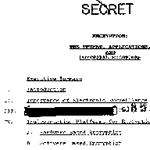A federal court in Washington, DC has dismissed two lawsuits against the Office of Personnel Management over the data breaches that compromised the records of 22 million federal employees and family members. The court acknowledged the "troubling allegations" raised by OPM's victims but ruled that "the fact that a person's data was taken" is not "enough by itself to create standing to sue." EPIC has long argued that data breach victims should not wait until they suffer identity theft to sue the parties that failed to protect their data. EPIC also filed comments last year with OPM recommending limits on data collection, has recommended updates to the federal Privacy Act, and has urged the Supreme Court to recognize a right to "informational privacy" and to ensure Privacy Act damages for non-economic harm.
The recent Department of Homeland Security memo rescinding the Deferred Action for Childhood Arrivals program creates new privacy risks for at least 800,000 individuals. At issue is the personal data provided to DHS by DACA applicants. In the 2012 Privacy Impact Assessment, the DHS stated that personal data would be "protected from disclosure to ICE and CBP for the purpose of immigration enforcement proceedings." Now that the program is set to expire, the personal data provided by DACA applicants is at risk of use for unauthorized purposes, implicating the federal Privacy Act. EPIC has long supported vigorous enforcement of the federal Privacy Act and opposed efforts that target individuals in immigrant communities.
The Public Voice will host an event with NGOs and Privacy Commissioners at the 39th International Conference of Data Protection and Privacy Commissioners in Hong Kong. "Emerging Privacy Issues: A Dialogue Between NGOs & DPAs" will address emerging privacy issues, including biometric identification, Algorithmic transparency, border surveillance, the India privacy decision, and implementation of the GDPR. Speakers include Chairman Isabelle Falque-Pterrotin of the CNIL and Article 29 Working Party, Commissioner John Edwards of New Zealand, and Director Eduardo Bertoni of Argentina. Also participating will be representatives of Access Now, EPIC, GP Digital, Privacy International, and the World Privacy Forum. The Public Voice, established in 1996, facilitates public participation in decisions concerning the future of the Internet.























